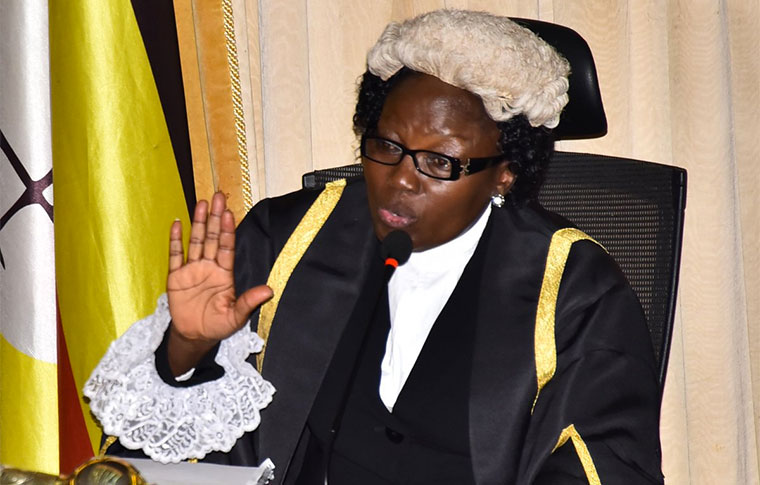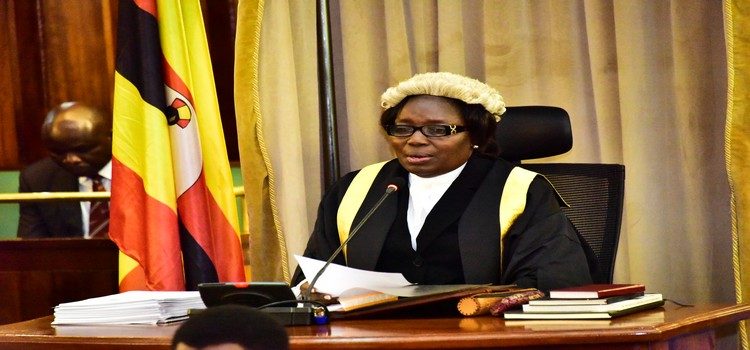Government’s explanation on the delayed ratification of the Malabo Protocol has left legislators unconvinced with the Speaker of Parliament, Rebecca Kadaga describing the reason as unserious.
The African Union (AU) in a bid to strengthen the Pan African Parliament (PAP), adopted the Protocol on 27 June 2014 in Malabo, Equatorial Guinea.
The Protocol among others expands the powers and functions of the PAP in line with the spirit and common vision of a united, integrated and strong Africa.
During a sitting of Parliament on Thursday, 15 August 2019, the Minister of State for Foreign Affairs, Hon Henry Okello Oryem, blamed the delay on the Ministry of Justice and Constitutional Affairs.
“Ministry of Foreign Affairs is usually at the tail end of the ratification process. We have written to the Ministry of Justice reminding them to take the necessary consultation and present the matter to cabinet for approval,” said Hon Oryem.
He added that once the Ministry of Justice plays its role, the Ministry of Foreign Affairs will prepare, sign and deposit instruments of ratification with the African Union.
The Deputy Attorney General, Hon Mwesigwa Rukutana, said that the delay has been caused by the need to examine the implications of ratifying the protocol.
“We have taken some time because we are cautious. We are looking at signing a protocol that empowers the PAP to make laws. The concern is on the weight of laws of PAP vis a vis the laws of Parliament of Uganda,” said Hon. Rukutana.
He explained that several clauses in the Protocol provide that laws of PAP will be supreme to Ugandan laws.
“This is not something that we should take lightly. Before we cede our sovereignty, we must be careful and where need be, those clauses will be avoided,” Hon. Rukutana added.
He asked for more time to allow government carry out consultations, saying that the delay is necessary.
Kadaga was however, irked by the responses from the two ministers saying that they have resorted to blame games.
“I am reluctant to accept your response to this issue. I think it is an insult that government comes and says that it is not me, it is the other one. As far as we are concerned, it is the Ministry of Foreign Affairs in charge of ratifications,” Hon Kadaga said.
She added that attributing the delay to the need to consult is not convincing because government was involved in formulation of the Treaty.
“I am flabbergasted by what the government people are saying. You cannot convince us that Ministry of Justice was not part of it; and that they found the President had gone by himself and signed the document and now they are looking at what to do. The President’s signature is on that document,” said Kadaga.
She also guided that for clauses that government of Uganda has reservations over, the Protocol can be ratified with reservations.
“You say we ratify but this area we don’t agree and deposit the instruments,” Kadaga said. She added that, “In 2017 is when I came to remind government about ratifying this protocol and I am supposed to report back to PAP in September this year.”
Lwemiyaga County MP, Hon. Theodore Ssekikubo, said it is wrong for government to feign ignorance on the processes leading to the formulation of the Treaty.
“Are you saying that the technical persons are called at the tail end? Then who is at the forefront of this process? The Ministers are trying to portray it as if the Treaty was signed haphazardly,” said Ssekikubo.
Hon. Asuman Basalirwa ( Bugiri Municipality MP) said that the Ministry of Foreign Affairs should take responsibility of the delayed ratification of the Protocol.
“When it comes to signing and ratifications of treaties, the Foreign Affairs Ministry is at the forefront. The arguments being given by the ministers fall short of their obligations and expectations,” said Basalirwa.
PAP is one of the nine organs of the AU provided for in Article 5 of the Constitutive Act of the Union adopted on 11 July 2000 in Lome, Togo. The Organ represents all the peoples of Africa. It is at present composed of 270 members of Parliament representing 54 African countries, with each country represented in the continental legislature by five MPs.







